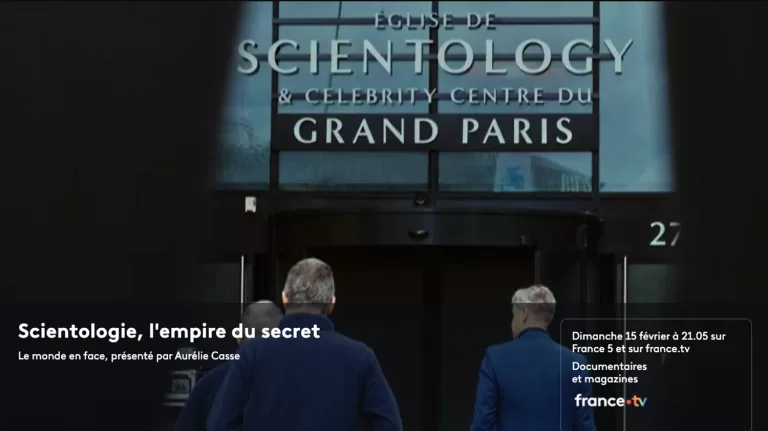Residents of a quiet countryside village in Sussex have complained after finding special 75th anniversary copies of Scientology’s primary book, ‘Dianetics’ left on their doorsteps in an unsolicited attempt to convert the village.
Locals in Ashurst Wood, a quaint village near East Grinstead, Sussex, took to social media yesterday after finding hardback copies of the Scientology book left on their properties. One resident described it as “intimidating”, explaining it’s “like a message to indicate that they’ll be back.”
Situated less than three miles from Scientology’s UK headquarters at Saint Hill, it is not unusual for residents of neighbouring villages and towns to receive promotional fliers and propaganda slipped through their letterboxes, but this is the first time we’ve heard of full hardback books being left at people’s doors.. and locals aren’t happy about it.
Commenting on a since-deleted post in a local Facebook group after finding a copy of Dianetics on her door step, one resident said “The last time they came round they were two huge Americans who filled my porch – wearing black suits and dark sunglasses. Like something out of Men in Black.” She continued, “I told them to get off my premises and not to go to the old lady next door as they would have seriously scared her. Then I watched them walk off so I checked and sure enough they went straight next door. So I shouted at them to shove it and they moved on. Not the way to be spreading the word in the name of religion. By scaring the arse off people. I’m actually really worried now about them knocking on my door as a follow up.”

Other residents called for the books to be gathered up and burned by the Ashurst Wood Bonfire Society, with one noting “I’m usually against burning books, but for this I’d make an exception.”
The local local village Clerk also chimed in, responding “I did my dissertation on ‘Cults and Crime’… and needless to say, it is a disturbing cult.”
Scientology recently released a special edition of their founding book, ‘Dianetics: The Modern Science of Mental Health’ to celebrate the 75th anniversary of its publication. Written by failed science fiction writer L. Ron Hubbard, it introduces the concept of ‘auditing’ and led to the creation of the Church of Scientology. Hubbard lacked any medical, mental health or scientific credentials and although the book was a moderate commercial success it was criticised by professionals at the time.
Nobel-prize winning physicist I. I. Rabi’s review of Dianetics in the January 1951 edition of Scientific American sums it up:
This volume probably contains more promises and less evidence per page than has any publication since the invention of printing.
Briefly, its thesis is that man is intrinsically good, has a perfect memory for every event of his life, and is a good deal more intelligent than he appears to be. However, something called the engram prevents these characteristics from being realized in man’s behavior.
During moments of unconsciousness and pain and at any time from conception onward, the “reactive mind” can still record experience, but experiences so recorded — engrams — are a major source of man’s misery, his psychosomatic ills, his neuroses and psychoses, his poor memory, and his generally inefficient functioning.
By a process called dianetic revery, which resembles hypnosis and which may apparently be practiced by anyone trained in dianetics, these engrams may be recalled. Once thoroughly recalled, they are “refiled,” and the patient becomes a “clear,” who is not handicapped by encumbering engrams and who can thenceforth function at a level of intellect, efficiency and goodness seldom if ever realized before in the history of man. The system is presented without qualification and without evidence. It has borrowed from psychoanalysis, Pavlovian conditioning, hypnosis and folk beliefs, but, except for the last, these debts are fulsomely denied.
The huge sale of the book to date is distressing evidence of the frustrated ambitions, hopes, ideals, anxieties and worries of the many persons who through it have sought succor.
I. I. Rabi
As for why the books are suddenly appearing on people’s doorsteps, Scientology policy indicates how well placed books are an important facet in their marketing matrix. In a 15 September 1959 bulletin titled ‘Dissemination Tips’, Scientology founder L. Ron Hubbard wrote “books make a personal contact all by themselves if they can be put in the right places.” He continues, “Books we have learned the hard way must be heavily in circulation or we get nobody in the front door […] you can easily see that the success of any neighbourhood depends on getting books into circulation in that neighbourhood.”
And in ‘Field Staff Member Commissions’, a policy letter written 7 years later on 23 December 1966 he explained “the book makes Scientology more real to the person, who is then easily persuaded to accept selection for an org service.”
Meanwhile, Scientology have pushed for restrictions to be placed on protestors handing out flyers outside their UK headquarters in an ongoing battle with Mid-Sussex District Council (MSDC), who are considering an application for a Public Spaces Protection Order (PSPO). In the latest round of negotiations between protestors and local officials, MSDC suggested implementing a ‘voluntary code of conduct’ as a means to avoid banning demonstrations all together.
Listed in the proposed code is a commitment that “protesters will not approach persons entering or exiting Church premises with leaflets or similar,” which organiser Alexander Barnes-Ross pushed back on, telling The Underground Bunker earlier this week “Scientology retain tight control over the lives of its members, particularly those who work at Saint Hill. These staff members in particular are part of the ‘Sea Organisation’ and they have signed one billion year contracts dedicating their lives (and all future lives) to working for the Church. They are provided communal accommodation in Crowborough and are often expected to work 14-18 hour days, 7 days a week with no time off in return for a weekly stipend of just £50”
“With the exception of a limited number of public-facing executives, for the most part Sea org staff are not permitted to own mobile phones and any access to the internet is closely monitored and heavily censored. For this reason, handing out cards and flyers that promote mental health services and community resources such as the Michael J. Rinder Aftermath Foundation is often the only way of reaching people who may not otherwise be aware of their existence.”
Negotiations are still ongoing, with a decision on whether to implement a ban and/or voluntary code of conduct expected in the coming weeks.










Someone should have a close look at one of those 75th anniversary editions to see if the pedophilic passage about a grown man kissing a 7 year old girl passionately (in Book 3 Chapter IX. section headed 'Differences') is still there — or if, like the semi-colons, it's finally been suppressed.
I’d love to get my hands on a copy for this precise reason!
Nobel Prize–winning physicist I.I. Rabi, reviewing Dianetics for Scientific American, declared that "this volume probably contains more promises and less evidence per page than has any publication since the invention of printing."
Lol it’s quite possibly my favourite review of Dianetics, and I had no idea it even existed until Tony published it on his blog recently
That explains their "high" booksales: The mission or org forces on-line members to buy the books, then they get dropped off at some doorsteps.
I wouldn’t be surprised if some wealthy Scientologist was convinced to part with vast sums of wealth in order to pay for thousands of copies of Dianetics to be distributed in the local area. Every book left on a doorstep will be counted as a ‘book sale’ in Scientology’s eyes.. I wonder whether it counts if said book finds its way into the bin.